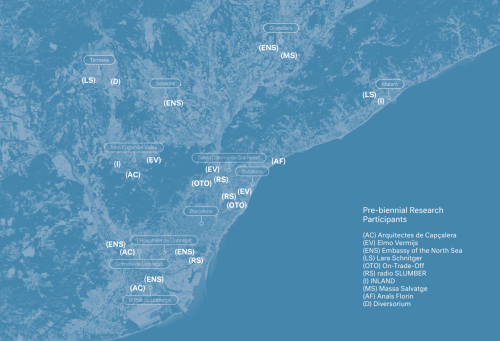Residency
25 June – 12 July 2023: Manifesta 15, Barcelona, ES
Manifesta 15 Barcelona has created a new framework for social and ecological research, actions and interventions that are being established with ten research participants across the metropolitan region of Barcelona. In the pre-biennial phase, starting over a year before the biennial officially opens, the selected participants are investigating specific thematic components in the three interconnected nodes identified by the Manifesta 15 team: along the Besòs river, the Llobregat delta and in the Collserola mountain range.
These investigations, in close collaboration with local experts and communities, will lead to new and alternative ways of calling attention to the climate crisis and will identify certain ecological and social transformations needed in the region. The social-ecological nodes of the metropolitan region connect with their immediate environments and articulate the relevant themes of the participatory process: how can we imagine a shared future together, how to manage imbalances, and how to care for ourselves and our natural surroundings, such as the Collserola mountain range.
The research participants will collaborate with communities and specialists within these locations, who will help to articulate the key problems within this eco-social process. This phase, which in Manifesta’s past three editions has been led by an Urbanist or a Creative Mediator, will instead be led by a diverse group of individual or collective researchers. The three identified issues are interrelated and span across diverse members of civil society which is why the Manifesta 15 team has invited a variety of practitioners, not only from the art world but also from other disciplines. These participants are interdisciplinary and work within the fields of art, science, law, architecture, human rights, activism and pedagogy.
The collective working within the theme of imagining the future is the transnational collective On-Trade-Off, who explore how technological innovation relies on natural resources. Their research will be focusing on energy, post-colonialism and the past and present of the industrial Besòs area.
The two participants Elmo Vermijs and the Embassy of the North Sea will focus their research on the rights and the voices of non-human actors and their relation to the natural environment in the nodes of the Collserola mountain range and the Llobregat delta. The collective radio SLUMBER explores participatory activities to help younger generations in terms of wellbeing and mindfulness. Linked to the theme of cure and care, they will be connecting with the Asian diaspora in the Besòs area. Lara Schnitger will lead her research using traditional crafts to illuminate, together with local collectives, radical visions of ecological feminism today and in a historical context. Arquitectes de Capçalera, a collective that emerged from the Barcelona School of Architecture, will be using collaborative tools in their participatory and speculative approach to architecture, which will act as the starting point for a long-term legacy.
In addition, four participants have been invited to focus on a special research project that explores the Catalan educational renewal movements. These movements are significant in terms of understanding the role of education and pedagogy in the histories of eco-social transformations that occurred both before and following Franco’s dictatorship in Spain. The project aims to shed light on how these historical movements have contributed to societal changes and what they can teach us today.
The collaborative agency INLAND will delve into the histories of schools set in natural environments at the beginning of the 20th century, such as Escola del Mar and Escola del Bosc. The Collective Massa Salvatge will research the work of Batec, a collective of teachers who envisioned a different school that is “more satisfying to live in and prepares a more humane and supportive generation.” Anaïs Florin is working on the history of Escoles in Lluita, a movement of schools in Barcelona during the 1970s that aimed to create alternative educational spaces emphasising the importance of social justice, community organising, and activism as integral parts of the educational process. An intersectional collective project, DIVERSORIUM, will engage with the archives of Vil·la Joana, a municipal school in Collserola Parc that hosted classes for students with physical and mental diversities under the name of “abnormal education.”
The projects presented after this research phase will serve as the foundation of the conceptual framework which will provide a departure point for the Open Call for local projects, launching in September 2023.

